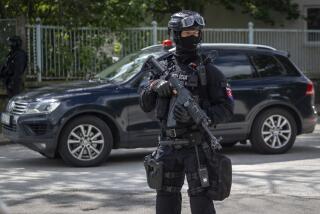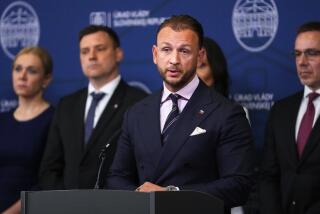Branded a Traitor, He Returns in Triumph
CACAK, Yugoslavia — In the moments before Mayor Velimir Ilic’s triumphal return Tuesday--after 43 days on the run from his own army in the forests surrounding this stronghold of democratic reform--the city’s deputy mayor described him as “an F-117 Stealth fighter. He’s invisible.”
But when Ilic took the stage Tuesday afternoon for the first opposition rally in Yugoslavia since the end of NATO’s air war, and a crowd of thousands chanted “Vel-ja! Vel-ja! Vel-ja!” in unison, it was clear that this 47-year-old Serb--an engineer turned mayor, then fugitive and finally hero--suddenly appeared as a front-line weapon of the opposition against Yugoslav President Slobodan Milosevic.
His only crime, Ilic told the crowd when he arrived on a makeshift stage in Cacak’s main square, was trying to protect the people who had elected him from being used as human shields by local military commanders during the war.
Telling the World About Civilian Deaths
“The army parked their tanks by the houses, and we asked them only to move the tanks away. But they refused,” Ilic explained. Then, at 3:10 p.m. May 10, NATO’s bombs fell--obliterating the tanks, factories and more than a dozen nearby homes, where three civilians died.
“I saw the bodies of these innocent people who had asked me for protection,” said Ilic, who was so moved by the horror that he decided to tell the world.
By phone, he told Western reporters and the U.S. government’s Radio Free Europe what had happened that day. And three days later, Ilic was officially labeled a traitor, fleeing to the hills after a tip by ham radio operators as military police prepared to surround his home.
He spent his 43 days on the run in the forests, protected by priests and even a pro-government village.
“I am proud they proclaimed me a traitor,” Ilic shouted from the stage Tuesday, a homecoming he deliberately timed for the opposition’s opening show of defiance against Milosevic.
“I am not guilty of treason,” said Ilic, who added that he was returning to office and was prepared to stand trial. “I have been in hell for 43 days, and my only crime was caring.”
Manufacturing Base Destroyed by Bombs
But if the mountains were hell, Ilic’s task ahead will be much the same.
He returned to an industrial city where the North Atlantic Treaty Organization left most of the industry in ruin. The 240 bombs and missiles that Deputy Mayor Dusan Drinjakovic said fell on Cacak during NATO’s 11-week air war demolished the city’s four major factories, which manufactured products from vacuum cleaners, stoves and radiators to military tanks, missile parts and troop-truck components.
“More than 6,000 workers now are without their factories here,” said Drinjakovic, who belongs to a different pro-democracy party than the mayor. “With four in every family, that means 24,000 without work. And there are just 80,000 people in the whole town.”
Meantime, a large army base in Cacak was left unscathed and is now fully staffed. The large police force in the city is loyal to Milosevic and is the only law in town. And Drinjakovic and others here said that, despite their love of democracy, the war has left them wondering how the Clinton administration and NATO now expect their movement to survive.
President Clinton “has made our situation only harder,” the deputy, who ran the city in Ilic’s absence, said when asked about a proposed U.S. strategy to reinforce opposition groups in cities like Cacak to drive Milosevic from power. “We had expectations that our little democracy would be protected. But now, what do you expect from these poor people here after the West has taken from them the last piece of bread?”
Even worse, he said, the U.S. government knew before NATO bombed Cacak that this is an anti-Milosevic town. During the three years since his election, Ilic had met in Belgrade, the Yugoslav and Serbian capital, with diplomats from the United States and Europe and briefed them on his pro-democracy views.
“Ilic was in direct contact with [U.S. State Department envoy] Robert Gelbard,” said Drinjakovic, who is also the mayor’s cousin. “So we’re very disappointed. Sometimes we feel all our efforts are lacking in concrete results.”
But on Third Street in Cacak’s Kulinovacko Polje neighborhood, there was only a trace of anger toward the U.S. and NATO on Tuesday, even as present and former residents retraced and recalled the horror those powers had visited on their land.
“How do I know which person I can blame,” said Natalia Curcic, who was bombed out of the house she and her husband, Novak, shared for the past 30 years. “Of course I’m angry with the Americans. They bombed my house. But Milosevic is very guilty--more guilty.”
Asked before the protest whether she planned to attend, Curcic shook her head. “I don’t care about politics. I need a roof.”
Down the street, Vidosava Boskovic and her son Bosko said they wished that they could attend the rally. “I’m still fixing our windows,” the mother said, as Bosko added that he had to go to work--at the demolished Sloboda factory where workers are still cleaning up after NATO’s airstrikes.
Asked who was to blame, NATO or Milosevic, Vidosava shouted loudly: “I blame the man who was supposed to protect us and didn’t protect us. We don’t blame NATO. Every man who cannot finish the job he is paid to do should be kicked out, and another man should do the job.”
And even Drinjakovic’s disappointment seemed to wane as the leaders of several small national opposition parties gathered in his city square--and as Ilic secretly prepared for his dramatic return.
“I am hopeful,” Drinjakovic said, just moments before he would embrace his long lost mayor with tears at the rally. “The importance of today’s meeting is that we expect, finally, Serbia will follow Cacak. And really, this is the only way.
“As real democrats, we now believe we should take power only through the pencil,” he said. “At this moment, after this terrible war, we don’t need more bloodshed in Serbia. Now, what is most important is human life.”
More to Read
Sign up for Essential California
The most important California stories and recommendations in your inbox every morning.
You may occasionally receive promotional content from the Los Angeles Times.










